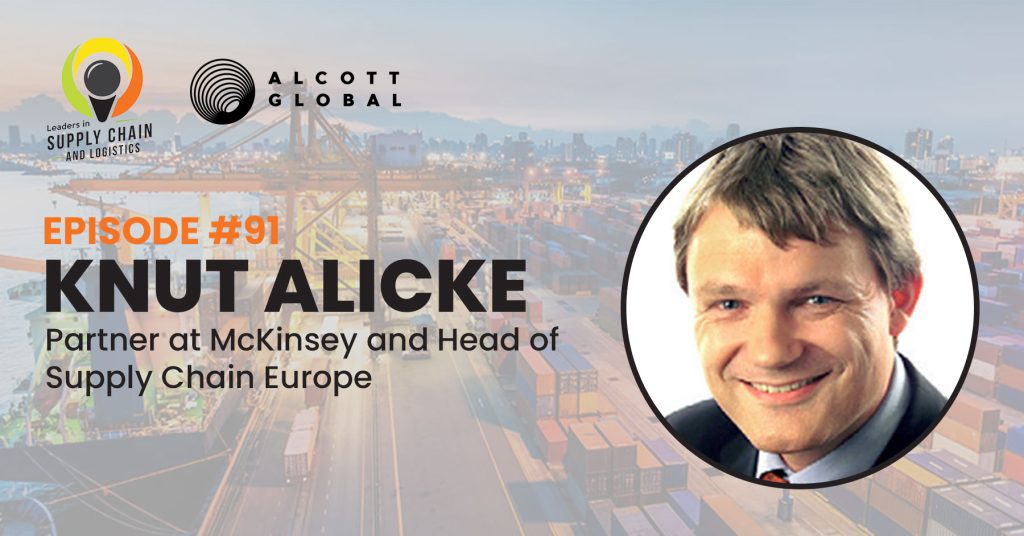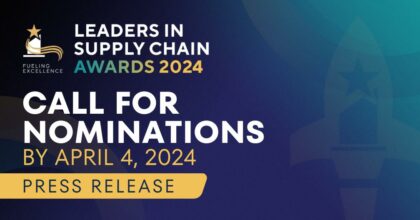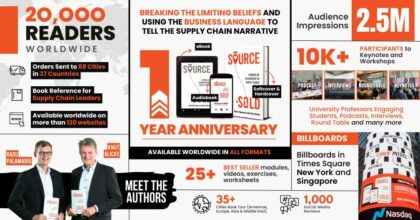Knut Alicke, partner McKinsey and Head of Supply Chain Europe. Knut is also a visiting professor of supply chain at the University of Cologne. And one of the global experts on the topics of operations, supply chain, and risk.
At McKinsey & Company, Knut is a leader of the firm’s work in manufacturing and supply chain. He advises clients on a variety of topics including supply chain management, digital supply chains, and advanced analytics, and supply chain transformations.
Knut has written several articles on subjects related to supply chain and is the author of a highly regarded book on supply chain management, “Planning and operation of logistics networks: cross-company supply chain management (in German)”.
Listen to the full discussion here:
-
- Listen on Stitcher
Connect with the Guest:
Knut Alicke: LinkedIn
Some of the highlights from the podcast:
- Becoming a supply chain professional vs becoming a musician
- Supply Chain leaders should have an MK budget
- China will no longer be the manufacturing hub of the world
- The difference between excel-heavy organizations and organizations adopting new systems
- 80% of companies plan to reskill people
- Following your passion and building relationships
Show notes:
- [00:35] I want to start with your personal story because you had a fascinating career. So tell us just a little bit about yourself.
- [02:43] Supply chain is what I’m really passionate about. And a small side story, I was not so sure whether I should become a supply chain professional or a musician.
- [03:36] Let’s start with the current reality and COVID-19, what are some of the biggest challenges that your clients are coming to you right now, and what’ss keeping them up at night?
- [05:30] One question that always pops up is indeed how to communicate the supply chain. How to make it for the board and how to ensure that the board understands the importance of the supply chain.
- [05:31] On this topic of how to make sure that the board understands the importance of the supply chain, what are some of the practical and very pragmatic advice or steps that you would suggest?
- [07:24] Companies who see the importance of supply chain and also take professionals that can tell a story and kind of think about what is the important message are successful.
- [08:55] I know that you put together a very insightful piece on resetting supply chains for the new normal. And in that article, one topic is that China will no longer be the manufacturing factory of the world, do you see that happening in the short term, in the long term, in the midterm? How fast is that actually going to happen?
- [11:03] For many years, there was an MGI report on global flows that there is a trend to be more regional and the COVID pandemic accelerated that.
- [15:29] If you want to move from China to the Eastern area, for example, you need to build a local capability. So that’s why it’s more kind of a midterm topic than a short term topic.
- [16:31] You had the number that 54% expect changes in terms of how they do planning and S&OP or IBP, do you see an acceleration of companies adopting the systems faster? Or what would the Excel focused or Excel-bound organizations do in this situation, specifically for supply chain planning?
- [17:33] Basically 48% of the companies that experienced delays are Excel-heavy companies and they said that they have no visibility, and 52% said that there was no problem because they have their planning system, end-to-end process, and people are trained.
- [21:26] We love to talk about digital, but the majority of companies are still very analog and need to fix the basics. But the good thing is that you can then kind of jumpstart or leapfrog and implement the new solutions.
- [22:00] You mentioned the topic of talent and that was the next one that I would have asked you. And then 90% of the respondents in your study also plan to increase digital supply chain talent in house. Let’s talk a little bit about that.
- [24:09] 80% said that we need to reskill, so we have our people, there are good people, they know the business but they don’t yet have the full spectrum of these new tools approaches so we need to reskill them, but as well, we need to make sure that we have new talent from the labor market, which is 55%.
- [27:17] What works best when you talk about re-skilling and educating the workforce to the new technology and to the new way of thinking?
- [28:51] First of all, you need to understand what is their baseline. So you need to do a bit of an assessment of what are capability gaps, and then often there are different levels of intervention.
- [31:45] For the younger people that are following the podcast, what would be some pieces of advice that you would have for them in terms of planning their careers or thinking about their careers and their professional life?
- [32:01] Always follow your passion and make sure that you work in an organization where you can kind of further develop your skills and where you have great people to have good relationships with.
About the Host:
The host, Radu Palamariu is the co-author of “From Source to Sold – Stories of Leadership in Supply Chain”. He has been named one of the top 3 Global Supply Chain Influencers on LinkedIn and was featured in Forbes, Bloomberg, WEF, Bangkok Post, and MIT Supply Chain Talent magazine. Radu invites executives to share stories and perspectives around technology, logistics, e-commerce, supply chain, and manufacturing, and their views on how the future will look.
Alcott Global connects and upgrades the supply chain ecosystem by finding the right talent through executive search, developing talent through learning solutions, and meeting supply chain technology needs through a comprehensive crunch base marketplace.
The supply chain executive search has been our focus since the very beginning, offering recruitment services for top-tier supply chain roles at every level of the end-to-end supply chain: plan, source / procure, make, and deliver. Our consultants have years of experience in placing top talent, in North America, LATAM, Europe, the Middle East & Africa, and APAC, and besides speed, one of our biggest strengths is our network within the supply chain industry, and we capitalize on it to find the best solutions.
Through the years, we have grown as an organization and our offerings with it. One of our initiatives, the learning solutions- training and supply chain academy, is focused on transforming leadership- self-leadership, executive presence, influence capital, and business acumen. Through Supplify, we aim to match corporations with the top technology companies to solve their supply chain and logistics challenges with a focus on innovation and digital transformation.
We are in constant touch with the leaders in supply chain, inviting them to inspire the supply chain professionals in thought-provoking podcast episodes and events, and showcasing what is possible at the yearly Leaders in Supply Chain Awards.
Related Episodes:
#86: Maria Villablanca Co-Founder and CEO of Future Insights Network
#89: Thierry Malleret Managing Partner of Monthly Barometer
#90: Konrad Bauer VP Supply Chain and Operations at Thermo Fisher Scientific








